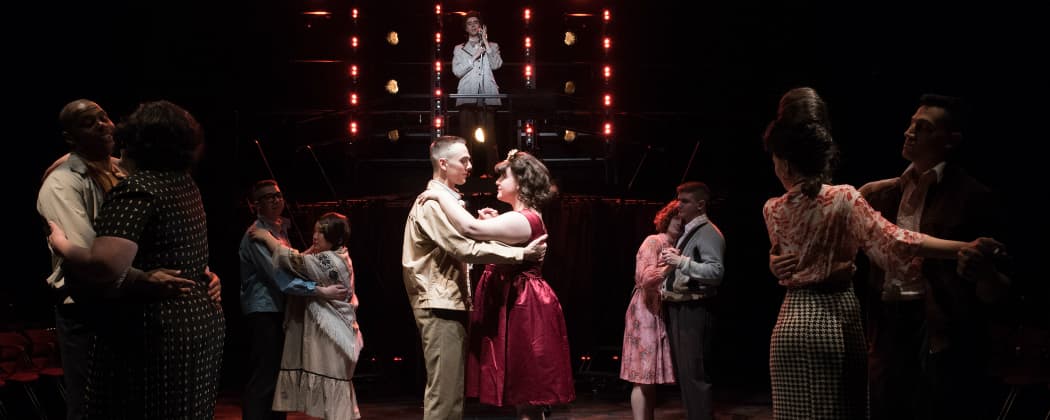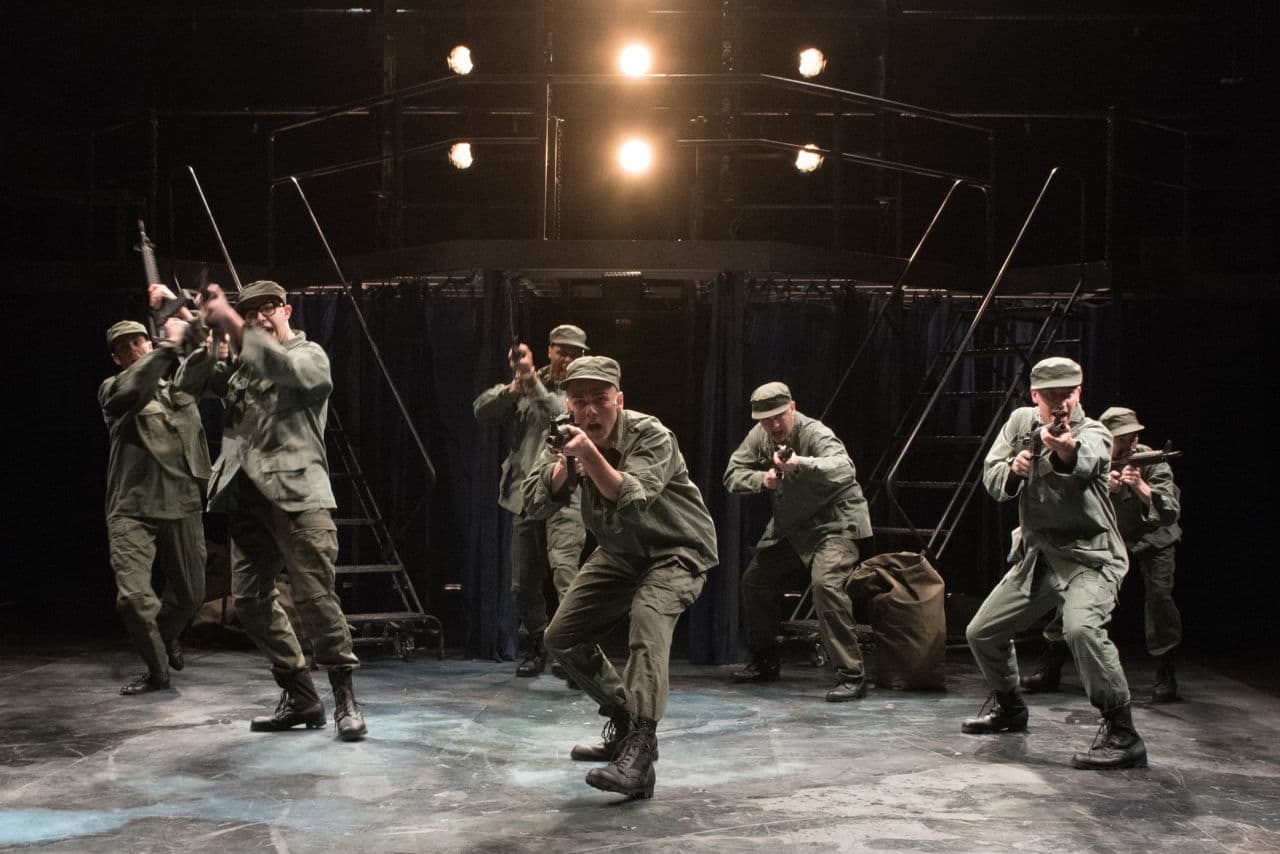Advertisement
Boston Premiere Of Pasek And Paul's 'Dogfight' A Rollicking Pleasure At SpeakEasy

There’s a sharp and vicious edge to SpeakEasy Stage Company’s Boston premiere of “Dogfight,” the critically lauded Benj Pasek and Justin Paul musical playing now through June 4 at the Boston Center for the Arts. The book, by playwright and screenwriter Peter Duchan, is based on the 1991 River Phoenix and Lili Taylor-starring film of the same name that was written by Bob Comfort. But this isn’t kids’ stuff, and there’s nothing lightweight or second-rate about this well-wrought production.
As with the film, “Dogfight,” the musical follows three Marines enjoying one last night in San Francisco before they ship off to Vietnam. Eddie Birdlace (Jordan J. Ford) is the corn-fed all-American from the heartland. Bernstein (Drew Arisco) is the glasses-wearing, virginal kid. Boland (Jared Troilo) is the street-smart, slightly hard-bitten one. They call themselves the Three Bees and boast in song about their “mighty sting.” They’re cocksure and clueless, ready for anything, and about to get in over their heads. It’s a rollicking pleasure to jump in with them.
But this is no sweet and goofy retread of “On the Town.” There are uncomfortable, even offensive, elements to their good times. These boys are complicit in a cruel and dehumanizing tradition: After contributing to a pot of money that’s used to put on a dance, the guys in their platoon compete for the surplus cash, which is awarded to the man who brings the ugliest date to the party. The rules (“No lookers, no hookers”) are simple and ruthless, stated with the gunshot brevity of so many other military slogans — “lock and load,” “Semper Fi.” This kind of fun and games has a spiritually lethal side.

We’ve seen similar stories before, but “Dogfight” possesses a blunt hardness that feels unique. It’s in the casual sweating that litters dialogue and lyrics alike, and it’s necessary for this specific story. That hardness gives the play’s softer elements a more solid footing, and it also drives the play’s sharper points deep into our psyches. Director Paul Daigneault (who also helmed SpeakEasy’s production of “Violet” earlier this season) understands all of this. In his hands, the production’s virtues become mutually reinforcing, and the tasteless conduct of some of the characters always feels justified.
Early on, the Marines sing about bidding “Farewell to / Chevrolets / To Willie Mays / The corner store,” and it’s not just because they’re off to war overseas. Their time in uniform is a rite of passage and the end of childhood; they, like their dads — like “all the dads” — are going to fight, kill, suffer and bleed. To get through it, they’ll need to grow emotional callouses, and mentally demoting women to the status of “droolin’ slobberin’ dogs” is a handy, if ungentlemanly, way to start the process.
The Marines scour the streets for unattractive dates, and the cheating Boland hires a streetwalker named Marcy — played with hilarious brio by the scene-stealing McCaela Donovan — to be his accomplice. Eddie, meantime, wanders into a diner where he meets Rose (Alejandra M. Parrilla), a folk music-loving waitress and the daughter of the eatery’s owner (Liliane Klein). Rose is voluptuous — what they once called big boned — and shy, but she’s also smart.
She catches Eddie’s eye because outwardly she’s plain, but she engages his attention and sharpens his internal conflict because she’s smart and caring. She also anchors the story, giving her male co-lead real substance to play against. “He could be nothing short of wonderful,” Rose sings to her Mama, convincing her to allow Rose to go to the party with Eddie. Her excitement and happiness sells the idea to Mama, while Parrilla winningly sells the audience on her character’s sympathetic qualities of vulnerability and hope.
The dance itself is another matter. It’s an exercise in male piggery, and it’s crass enough — that is, mean enough — to make you squirm. When Marcy fills Rose in on the nature of the party, Rose lets Eddie have it with a sock to the eye. Her rage, devoid of self-pity, feels justified and self-assured. Rose has more dignity in her right hook than the whole pack of jarheads has in their communal swagger.
Luckily for Eddie, Rose has also got class. Her politeness and civility aren’t the qualities of a shrinking violet; they reflect her strength of character. After giving Eddie a second chance and agreeing to have dinner with him, Rose proves herself every bit as fluent with rough language as her profanity-spewing date: No sooner have they been seated, in order to teach Eddie a lesson, she turns the elegantly set table on him and laces her order with a hair-raising (and gut-busting) string of expletives.
The play’s R-rated comedy has its foundations in some serious thinking. The date is specified, in passing, as November 21, 1963; attentive audience members will understand why this is important. It’s the night before President Kennedy’s assassination. The Three Bees are looking forward to a night of using and humiliating women for their own amusement, from the “dogfight” to a post-party visit to a brothel, but in a larger sense this is a play about a muscular young country, the brash and confident hero of World War II, approaching a crisis of confidence and identity. It’s a crisis we still haven’t resolved.
SpeakEasy’s production is proof that sometimes less really is more. Cristina Todesco’s scenic design is limited to bare minimums; furnishings (tables, a bed, rolling platforms) are whisked in and out of the performance space to maximize room for Larry Sousa’s choreography. Jeff Adelberg’s lighting fills in settings for us, from the soft flickering of candles in a fancy restaurant to the carnival atmosphere in a house of carnal pleasures.
The field of battle is also visited, briefly, in a wracking scene where all the design elements shine. Adelberg’s lighting complements the scene’s effective staging, while David Reiffel’s sound design stands out like nowhere else.
Costume designer Elisabetta Polito is allowed to do more with more, though, and she accomplishes a fine job throughout, providing the Marines with authentic military dress and convincing period civvies, and also bolstering Rose and the other female characters with (mostly) spot-on wardrobe choices. Case in point: The broken zipper on the back of Rose’s maroon dress, together with her clashing blue purse, speaks as eloquently about Rose’s gusto as her lack of opportunities. (That said, and as a native New Mexican, I had to roll my eyes at the way one character at the “dogfight,” a woman supposedly from Albuquerque, was dressed in a serape.)
This being a musical, all ears are going to be on the cast’s voices and the work of a cadre of live musicians. José Delgado’s music direction, in contrast to Todesco’s scenic design and like Polito’s costume work, is anything but minimal. The score is lush and sophisticated, and Delgado brings out its nuances. The actors’ singing voices are, on occasion, a little too thin to stand up to the orchestration (a minor consideration that’s easily worth the trade-off of the cast’s terrific chemistry). But for the most part, they sing well and their voices mesh beautifully, especially in the ensemble numbers.
The play is bookended by scenes in which Eddie returns to San Francisco three years later, shell-shocked and psychologically shattered, looking for the compassion a folk-song loving young woman once showed him. The laughter fades to a sigh. Even today, we laugh at peaceniks and idealists, but they’re still the ones who ease our terrors and soothe our wounds.
“Dogfight” continues through June 4 at the Stanford Calderwood Pavilion at the Boston Center for the Arts. For tickets and more information, visit SpeakEasy Stage Company’s website.

